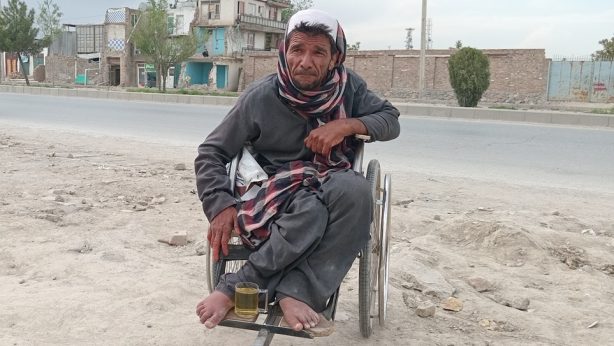From Refusal to Cooperation: A Father’s Change in Perspective on the Polio Vaccine

Marzia Frotan
Herat, Afghanistan – Hamid Gul, a 38-year-old resident of Shindand district in Herat, who used to adamantly refuse the polio vaccine a few years ago, has now become a committed supporter, cooperating with the vaccination teams.
This sudden and fundamental change in his attitude came at a heavy price—his two-year-old son contracted polio and became paralyzed due to Hamid Gul’s refusal to vaccinate him.
Hamid Gul had always refused vaccination for his children. Whenever vaccination teams came to his house, he would chase them away with hostility.
However, as a consequence of his actions, the polio virus found its way into his home, and nearly four years ago, his two-year-old son, Sayed Gul, contracted polio and one of his legs became paralyzed.
Now, Hamid Gul regrets his past actions and attributes his refusal to a lack of awareness about the dangers of polio and the benefits of vaccination.
“After my son contracted polio and his leg was paralyzed, I decided to start cooperating with the polio vaccination teams. Now, when they come to our village, I go door-to-door with them and encourage families to bring their children out for vaccination,” he says.
As a father of seven children, during every polio vaccination campaign, Hamid Gul not only ensures that his two children under five years of age are regularly vaccinated, but he also encourages his neighbors to vaccinate their children.
 Hamid Gul says, “After my son contracted polio and his leg was paralyzed, I decided to start cooperating with the polio vaccination teams. Now, when they come to our village, I go door-to-door with them and encourage families to bring their children out for vaccination.” © Polio Free Afghanistan/2024/Marzia Frotan
Hamid Gul says, “After my son contracted polio and his leg was paralyzed, I decided to start cooperating with the polio vaccination teams. Now, when they come to our village, I go door-to-door with them and encourage families to bring their children out for vaccination.” © Polio Free Afghanistan/2024/Marzia Frotan
Pain Without Cure
After Sayed Gul became paralyzed, Hamid Gul made numerous efforts to seek treatment for him, visiting various hospitals, but to no avail. Unfortunately, he paid the price for his refusal, which for years persisted steadfastly against the polio vaccination teams until it eventually gave way.
Anar Gul, Hamid Gul’s 45-year-old uncle, initially shared Hamid’s views against the polio vaccine and considered it haram. However, his perspective shifted when Sayed Gul contracted polio and became paralyzed.
“Sayed Gul’s paralysis started with pain in one of his legs. He was very young when the pain began, and he cried a lot. We took him to the Shindand hospital and showed him to the doctor, who said that he was affected by polio,” he added.
Anar gul further explained, “The doctor prescribed a little medicine and said that if it doesn’t help, then know that your child is paralyzed. We took him to the hospitals in Herat city two or three times more, but it didn’t help at all, and his leg became weaker year by year.”
Hamid Gul’s neighbor, 26-year-old Wali Shah, says that Hamid Gul and his family refused the vaccine based on false beliefs, but after Sayed Gul contracted polio, their perspective changed, and since then, they have been cooperating with the vaccination teams in every campaign.
 After Sayed Gul became paralyzed, Hamid Gul made numerous efforts to seek treatment for him, visiting various hospitals, but to no avail. Unfortunately, he paid the price for his refusal, which for years persisted steadfastly against the polio vaccination teams until it eventually gave way. © Polio Free Afghanistan/2024/Marzia Frotan
After Sayed Gul became paralyzed, Hamid Gul made numerous efforts to seek treatment for him, visiting various hospitals, but to no avail. Unfortunately, he paid the price for his refusal, which for years persisted steadfastly against the polio vaccination teams until it eventually gave way. © Polio Free Afghanistan/2024/Marzia Frotan
Decrease in Refusal
In recent years, refusal of the polio vaccine in Shindand district—where Sayed Gul contracted polio and became paralyzed due to his family’s refusal—has decreased.
Health officials in the district say that thanks to the efforts of health teams, the level of public awareness has increased, and refusal to participate in the polio vaccination campaign has significantly decreased.
Dr. Faheem Sahibzada, in charge of the polio vaccination program in Shindand district, explains that Sayed Gul contracted polio due to his family’s lack of awareness about the polio vaccine.
He added, “The case of a child named Sayed Gul, who was reported to have a weakness in his leg by a doctor from a private clinic, was confirmed by us to be polio after completing laboratory tests.”
“The main reason for this case was that these people entirely rejected the polio vaccine,” he explained.
Shindand is the largest district in Herat, and according to health officials, it is still at risk of the polio virus.
Recently, a polio vaccination campaign was conducted in this district. Health officials say that a total of 265 teams are active in the district during each campaign, going door-to-door to vaccinate children.
Sayed Gul is the last child to have contracted polio in the Shindand district of Herat. Notably, there have been no reported cases of polio in the province over the past three years.


